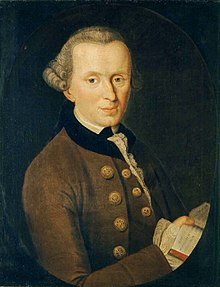
.
(’22 april 1724′ – ’12 february 1804′)
(‘age 79’)
.
/kænt/
‘german’ –> [ɪˈmaːnu̯eːl kant]
.
(german philosopher)
(considered a ‘central figure’ in ‘modern philosophy’)
.
“critique of pure reason”
(1781)
(he was 57 years old)
.
(stimulated by taking seriously hume’s skeptical conclusions about such basic principles as ’cause and effect’ and the implications of this skepticism for kant’s grounding in ‘rationalism’)
(died @ ‘age 80’)
(‘kant’ argued that the ‘human mind’ creates the structure of ‘human experience’, that ‘reason’ is the source of ‘morality’, that ‘aesthetics’ arises from a faculty of disinterested judgment, that ‘space’ and ‘time’ are forms of our sensibility, and that the world as it is “in-itself” is independent of our concepts of it)
(‘kant’ took himself to have effected a “copernican revolution” in philosophy, akin to copernicus’ reversal of the ‘age-old belief’ that the ‘sun’ revolved around the ‘earth’)
(his beliefs continue to have a major influence on contemporary philosophy, especially the fields of ‘metaphysics’, ‘epistemology’, ‘ethics’, ‘political theory’, and ‘aesthetics’)
(politically, ‘kant’ was one of the earliest exponents of the idea that ‘perpetual peace’ could be secured through ‘universal democracy’ and ‘international cooperation’)
(he believed that this will be the eventual outcome of ‘universal history’, although it is not rationally planned)
(the exact nature of kant’s ‘religious ideas’ continues to be the subject of ‘especially heated philosophical dispute’, with viewpoints ranging from the idea that ‘kant’ was an ‘early’ + ‘radical exponent’ of ‘atheism’ who finally exploded the ‘ontological argument’ for ‘god’s existence’, to more critical treatments epitomized by ‘nietzsche’ who claimed that ‘kant’ had “theologian blood” and that ‘kant’ was merely a ‘sophisticated apologist’ for ‘traditional christian religious belief’, writing that “kant wanted to prove (in a way that would dumbfound the ‘common man’), that the ‘common man’ was right: that was the secret joke of this ‘soul'”)
(in one of kant’s major works, the Critique of Pure Reason (Kritik der reinen Vernunft, 1781), he attempted to explain the relationship between ‘reason’ and ‘human experience’ and to move beyond the failures of traditional ‘philosophy’ + ‘metaphysics’)
(‘kant’ wanted to put an end to an era of futile and speculative theories of ‘human experience’, while resisting the skepticism of thinkers such as ‘david hume’)
(‘kant’ regarded himself as ending and showing the way beyond the impasse which modern philosophy had led to between ‘rationalists’ and empiricists, and is widely held to have synthesized these two early modern traditions in his ‘thought’)
(‘kant’ argued that our experiences are structured by necessary features of our ‘minds’)
(in his view, the mind ‘shapes’ and ‘structures’ experience so that, on an abstract level, all human experience shares ‘certain essential structural features’)
(among other things, ‘kant’ believed that the concepts of space and time are integral to all human experience, as are our concepts of “cause” and “effect”)
(1 important consequence of this view is that our experience of things is always of the phenomenal world as conveyed by our ‘senses’: we do not have direct access to ‘things in themselves’, the so-called noumenal world)
(‘kant’ published other important works on…)
‘ethics’
‘religion’
‘law’
‘aesthetics’
‘astronomy’
‘history’
.
(these included the Critique of Practical Reason (Kritik der praktischen Vernunft, 1788), the Metaphysics of Morals (Die Metaphysik der Sitten, 1797), which dealt with ‘ethics’, and the Critique of Judgment (Kritik der Urteilskraft, 1790), which looks at ‘aesthetics’ + ‘teleology’)
.
.
.
.
.
.
💕💝💖💓🖤💙🖤💙🖤💙🖤❤️💚💛🧡❣️💞💔💘❣️🧡💛💚❤️🖤💜🖤💙🖤💙🖤💗💖💝💘
.
.
*🌈✨ *TABLE OF CONTENTS* ✨🌷*
.
.
🔥🔥🔥🔥🔥🔥*we won the war* 🔥🔥🔥🔥🔥🔥
